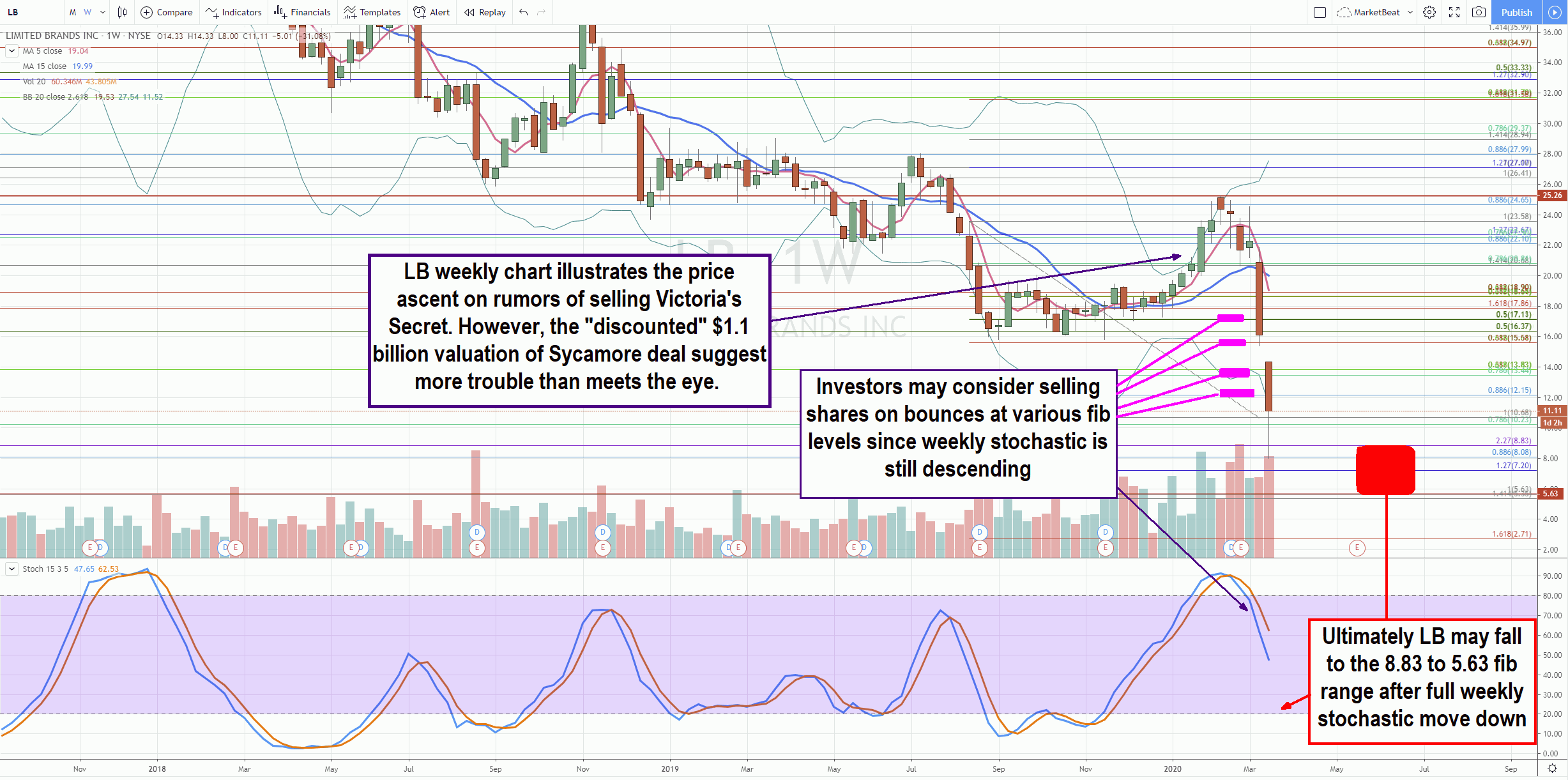Shares of retailer
L Brands (NYSE: LB) have fallen victim to the coronavirus market contagion along with the rest of the
retail sector (NYSEARCA: XRT) . After peaking at $25.26 on Feb. 10, 2020, shares collapsed (-68 percent) to a 10-year low of $8.00 on Mar. 17, 2020. The market cap losses were beyond double the
S&P 500 (NYSEARCA: SPY)which dropped over (-30 percent). While the retail sector and consumer discretionary stocks attempt to base and stage some sort of rally, investors may want to avoid L Brands stock or use the dead cat bounce to trim their positions.
De-levering Brands
Through the years, L Brands has acquired (IE: Henri Bendel, La Senza), spun-off (IE: Abercrombie and Fitch (NYSE: ANF) ) and sold (IE: Lane Bryant, Express, Gaylan’s) many brands spearheaded by retail icon Lex Wexner. In 2010, the company sold off the rest of its Limited Stores In 2018, L Brands closes Henri Bendel stocks and sells off La Senza leaving two organically grown brands Victoria’s Secret Bath and Body Works. In 2019, L Brands closed 59 Victoria’s Secret stores as comparable sales declined five percent. Bath and Body Works still showed strong 13-percent growth. Shares of LB were rising on rumors of a potential merger or acquisition despite posting weak Q4 2019 earnings. In February 2020, L Brands announced plans to sell 55-percent of Victoria’s Secret to private equity firm Sycamore Partners for $550 million as Chairman Leslie Wexner planned to step down upon completion of the deal. This values Victoria’s Secret at around $1.1 billion. This comes as a major disappointment to shareholders since the fledgling Victoria’s Secret posted 2019 revenues of $6.8 billion.
Sycamore Partners
This private equity firm has a notorious reputation for playing hardball with mixed outcomes for the acquired companies. They were able to revive office supply store chain Staples as well as retailers Talbots and Belkin. However, fallen retailer Aeropostale accused Sycamore of intentionally providing the company a loan with the intent to acquire the company assets in bankruptcy as a creditor. The firm is infamous for acquiring companies under the guise of a turnaround project only to butcher and sell off the parts (IE: Nine West, Jones Group).
Giving Away the Store
Wexner is known for his dealing prowess and this valuation seems uncharacteristic for him, unless he felt Victoria’s Secret was in dire straits. The significantly “low” price for Victoria’s Secret has investors concerned things be worse than they appear inside the company. Sycamore buffered their investment with a loss provision indicating that L Brands would be responsible for the first $440 million of losses generated by Victoria’s Secret. This is almost the sum of what L Brands received for their stake. Sycamore would take over operations as Les Wexner steps down as chairman of L Brands. There is a $2.5 billion risk to Sycamore in the form of leasehold agreements.
And Then There Was One
L Brands still carries significant debt which is now on the shoulders of their single brand Bath and Body Works. While growth has been on an upward trajectory since 2010, the debt load will no doubt shrink operating margins. The make matters worse, most of the Bath and Body Works stores are located in shopping malls. Mall traffic has been on a decline for years. The new challenge of the coronavirus pandemic has shuttered mall closings throughout the country. Bath and Body Works will no doubt feel the impact of vaporized mall traffic in addition to shortened store hours during Q2 and possibly Q3 of 2020. Like other brick and mortar retailers, it’s nearly impossible to maintain forward guidance with the uncertainty of COVID-19 social distancing protocols established in every state. The company will be significantly diluted after the Sycamore deal. The 45-percent remaining stake will show on the balance sheet as an asset, but that would turn into another write down if Sycamore fails to deliver.

Stock Price Analysis
Shares of LB started off March 2020 in a very buoyant manner staying within the $20-$24 price range, despite other retailers getting hit from the market and sector sell-off. However, the weekly stochastic fell below the 80-band triggering massive sell-off on the 5-period moving average rejection. This formed the bearish mini inverse pup stochastic formation which targets the lower Bollinger Bands (BBs). LB shares overshot the lower BBs to bounce off the $8.08 Fibonacci (fib) price level. Dramatic price drops under the BBs can trigger a knee jerk “slingshot” bounce reaction once the share price penetrates back up through the lower BBs. Investors stuck in these shares may consider using the dead cat bounces to trim down positions at each key fib level from $12.15, 13.83, $15.58 and $17.13 if possible. The weekly stochastic is still in a descent mode, so shares should eventually head back down once the 5-period MA falls lower. Prudent investors should consider unwinding positions and take advantage of the coils to revisit at lower prices which may form at the lower fib range of $8.83 to $5.63 until the coronavirus pandemic passes.
Before you make your next trade, you'll want to hear this.
MarketBeat keeps track of Wall Street's top-rated and best performing research analysts and the stocks they recommend to their clients on a daily basis.
Our team has identified the five stocks that top analysts are quietly whispering to their clients to buy now before the broader market catches on... and none of the big name stocks were on the list.
They believe these five stocks are the five best companies for investors to buy now...
See The Five Stocks Here
Wondering when you'll finally be able to invest in SpaceX, Starlink, or X.AI? Enter your email address to learn when Elon Musk will let these companies finally IPO.
Get This Free Report
Like this article? Share it with a colleague.
Link copied to clipboard.